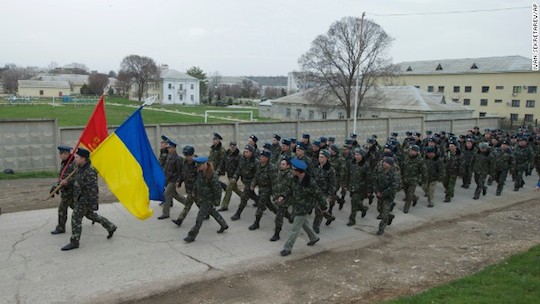We run our website the way we wished the whole internet worked: we provide high quality original content with no ads. We are funded solely by your direct support. Please consider supporting this project.
The Kingdom, Just War Theory, and Ukraine
 History textbooks often read like surveys of how countries handled war with other nations. The stuff between the conflicts reads like precursors and aftermath to the history-making actions of war. Now we observe the rising tension between Russia and Ukraine along with other world leaders as they try to determine how to respond. Sadly, church history also reads like God’s people have been full participants in the ups and downs of war, as if it is the church’s duty to join forces with the “just” side. If we determine that a war is just, then Christians have the right and even the duty to support it. This is the common way we have been taught in the Christian church to think about war. However, we don’t often think about where this line of reasoning originates, and rarely do we ever question its validity. Here are some thoughts about this from Greg:
History textbooks often read like surveys of how countries handled war with other nations. The stuff between the conflicts reads like precursors and aftermath to the history-making actions of war. Now we observe the rising tension between Russia and Ukraine along with other world leaders as they try to determine how to respond. Sadly, church history also reads like God’s people have been full participants in the ups and downs of war, as if it is the church’s duty to join forces with the “just” side. If we determine that a war is just, then Christians have the right and even the duty to support it. This is the common way we have been taught in the Christian church to think about war. However, we don’t often think about where this line of reasoning originates, and rarely do we ever question its validity. Here are some thoughts about this from Greg:
For the first three centuries of the church, Christians understood that it was their Kingdom duty to follow Jesus’ example of forgoing the use of violence and expressing God’s self-sacrificial love toward enemies. Unfortunately, this mindset was the first thing we lost when the Church acquired political power in the fourth century. Because many leaders viewed this political power as a blessing from God rather than a temptation from the enemy, Jesus’ refusal to use coercive power had to be radically rethought.
Augustine employed his formidable intellectual skills toward this end. He speculated that Jesus’ decision to suffer unjustly rather than use coercive force was not intended to be a permanent example for all Christians to follow. Rather, he reasoned, Jesus had to suffer and die unjustly because he was the Savior, and his suffering and death were necessary in order for us to be freed from the devil and reconciled to God. Now that this has been accomplished, however, and now that God (allegedly) had given Christians the power of the sword, it was not only permissible for Christians to use violence when the cause was “just”, they had a responsibility before God to do so.
This was the beginning of what’s called the ‘just war’ tradition within Christendom.
Now, we could at this point debate the relative merits of various versions of just war theory as applied to nations. Under what circumstances is a country justified in going to war? What warfare tactics are justified once a nation is involved in war? Some would even want to debate how various just war theories might be applied to a nation’s war on crime inside its own borders.
I have no problem with people applying just war theory in these ways. Since the New Testament assumes the kingdoms of the world will rely on the power of the sword, it may (or may not) be helpful to debate what constitutes a just use of the sword. There’s no inconsistency in a person holding that following Jesus entails that one should never engage in violence while also believing that there may be circumstances in which, as a last resort, nations may be justified in going to war.
My issues with just war theory arise when people follow Augustine’s lead and think it has something to say about how Kingdom people respond to enemies. For, contrary to Augustine, the New Testament is as clear as it can be that Kingdom people are called to follow Jesus’ example of sacrificing themselves for enemies rather than resorting to violence to resist or conquer them.
Jesus’ willingness to suffer out of love for his enemies rather than use coercive force against them is consistently identified in the New Testament as the ultimate expression of God’s love and the ultimate means by which the Powers are defeated. It’s what Calvary is all about. And so, the willingness of Kingdom people to suffer out of love for our enemies rather than use coercive force against them must still be considered the ultimate expression of God’s love.
Category: Essays
Tags: Augustine, Current Events, Enemy Love, Essay, Just War, Non-Violence, War
Topics: Ethical, Cultural and Political Issues
Related Reading

Podcast: What are Your Thoughts on MMA Fighting and Other Violent Sports?
Greg *wrestles* through violence in sports. http://traffic.libsyn.com/askgregboyd/Episode_0373.mp3

The Image of Cross-Like Love: God’s Self-Portrait, Part 6
In the previous blog I argued that God is cross-like love. In this blog I’d like to take this a step further by demonstrating why the cross alone could function as the definitive revelation of God’s true character and by showing how this revelation weaves together everything Jesus was about. If you want to know…

The Worst Heresy That Never Got Anyone Burned at the Stake
According to John’s Gospel, on the evening of his crucifixion Jesus clearly articulated the single-most important quality by which his followers would be recognized: “By this all men will know that you are my disciples, if you love (agape) one another” (John 13:35). Or again: “But I tell you, love your enemies and pray for…

What I Am, and Am Not, Doing In These Blog Posts
In this post I’d like to try to help some potentially frustrated readers by explaining what I am, and am not, trying to accomplish in this series on the violent portraits of God in the OT. First let me explain something. My forthcoming book, The Crucifixion of the Warrior God, fleshes out and defends a…

The “Third Way”: Seeing God’s Beauty in the Depth of Scripture’s Violent Portraits of God
A publishing house recently sent me an advance copy of a book written by a well known scholar on the topic of the non-violent God revealed in Jesus, asking me to endorse it. (Publishing protocol stipulates that endorsers not critique a book before it’s released, so I will not mention the name of the author…

